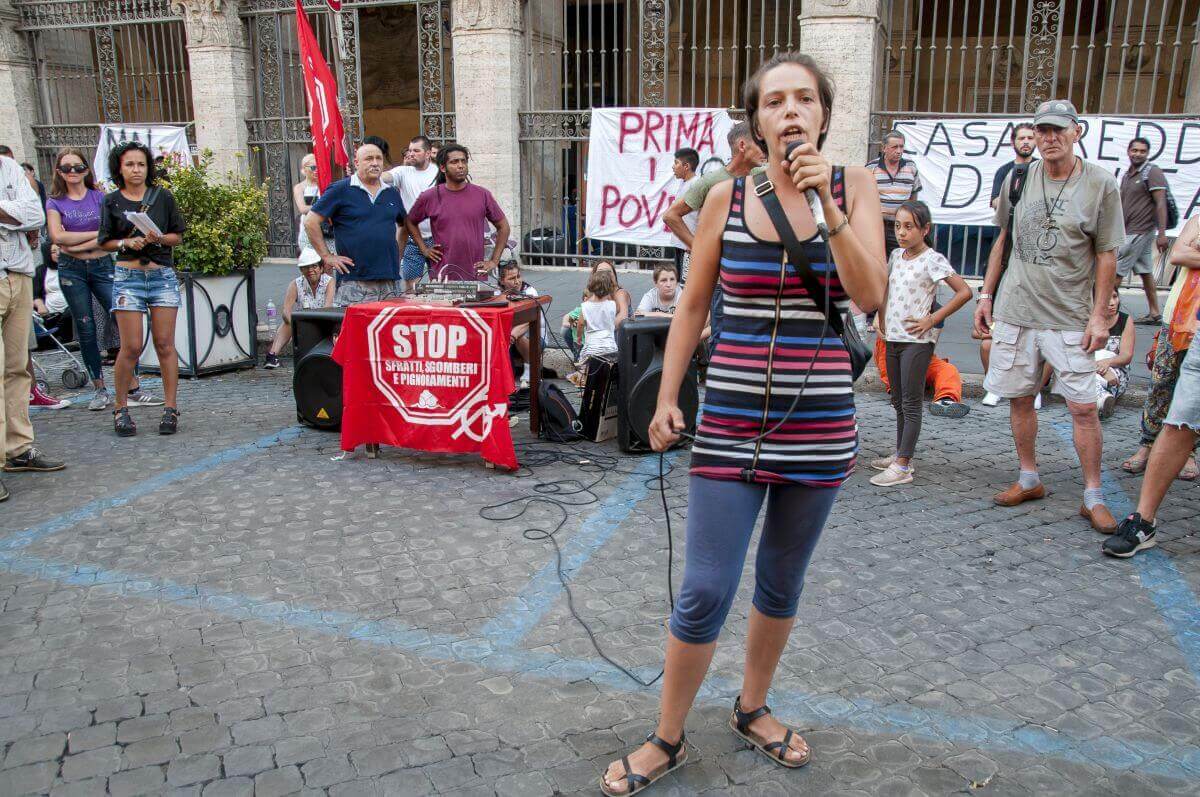Virginia Raggi, mayor of Rome, has declared war on the movement for housing rights. At the end of August the Five Star Movement found a clear enemy, and to confront it they chose the hard-line. First they evicted an occupation at via Quintavalle, at Cinecittà. Then another at piazza Indipendenza in the very centre of the Rome, just next to Termini station. Today it is only the social movements and those participating in them who remain, erecting barricades in the attempt to defend the last migrants, fighting the battle against poverty and racism.
A roof can be found for mothers and children provided that under the same roof no man is being sheltered.
This week Virginia Raggi brought a new term into the political agenda: ‘fragility’. What a shame that the modus operandi of the local administration has swept over those people too, the fragile ones. Because by ‘fragility’ the Five Star Movement mean women and children alone. Little matter if those women and children live with a man, a father, a husband, a companion. The man is not fragile. It is a superficial solution: a roof can be found for mothers and children provided that under the same roof no man is being sheltered. The result is inevitable. As the lucid analysis by the movement for housing puts it:
“Separating the emergency, dividing nuclear families, marginalising those who do not fall under the category ‘fragile’, serves to prevent the resistance of those who want to remain united and find dignified and definitive solutions.”

You can see the short circuit between those who point to a human face, trying to recuperate some humanity, and those who are simply considered to be a problem. An emergency. A bug in the system that needs to be constructed. This way of reacting, more right-wing and inhumane than the new immigration laws of the Minniti Decree, more populist than Matteo Salvini, has done nothing except increase the tension in Rome, generating in turn interventions from law enforcement agencies which serve to remove the question rather than resolve it. The formula is always the same: social problems are transformed into problems of public disorder.
The central question now, beyond political slogans, is to truly understand what ‘fragility’ means. Does ‘fragile’ only refer to a nuclear family around which there are children, the old and disabled or also “someone who out of necessity occupies a building; who doesn’t have a sufficient salary to pay the rent or a loan; who has waited for years for social housing that never arrived; who lives in a temporary housing shelter and is about to be removed, or perhaps a young precariat?”
And then another seemingly banal but in fact vitally important question posed by the movement for housing is: do single homeless people, men or women, have rights in the eyes of the local government? These questions need to be brought into the public debate. Speaking only of ‘fragility’ serves to fragment and divide the last bastions of struggle that continue to ask for serious definitive and systemic solutions; that push to escape the logic of ‘emergency.’
Speaking only of ‘fragility’ serves to fragment and divide the last bastions of struggle that push to escape the logic of ‘emergency.’
Of course ‘fragility’ is just the most recent term coined by a political class to foster divisions between the poor – in this case between the fragile and less fragile – while the central question of income itself is closed in a drawer behind lock and key. Because if 10,500 families are on a waiting list for social housing, it is because they do not have adequate income to pay for a house. If 1500 families are stuck in such structures for decades it’s because they do not have adequate income to pay for a house. If around 2000 families live in an occupation by the housing movement it’s because they do not have adequate income to pay for a house. According to recent estimates around 80% of this last group are on a waiting list for social housing.

Today proposing real housing policy alongside measures tackling low income is not only difficult but politically inconvenient. Imagine an electoral campaign with social housing, minimum income, social inclusion, refugee accommodation at the centre proposed by a movement that comes from the web and, in particular, from social networks. Its electoral base would be immediately trashed by those who, on TV and other corners of the internet, wearing questionable hoodies, work to weaponise populism.

The actual objective of the Five Star Movement therefore is concerned only with the next round of electoral campaigns: with avoiding a situation in which Matteo Salvini’s populism takes hold in Rome and in Lazio. That is the new electorate to convince, a disenfranchised right-wing that could find its new life in Salvini. According to estimates this is at least 7-9% of votes. A lot. Too many to lose given that the electoral move to Five Star Movement’s left is by now finished. This is Virginia Raggi’s party, playing only to win an electorate attracted to ‘populism’, and this, and only this, is why they need terms like ‘fragility.’
***
This article was first published in Italian on il Salto. It was translated by Jamie Mackay.
![Political Critique [DISCONTINUED]](http://politicalcritique.org/wp-content/uploads/2015/09/Political-Critique-LOGO.png)
![Political Critique [DISCONTINUED]](http://politicalcritique.org/wp-content/uploads/2015/09/Political-Critique-LOGO-2.png)
Why are these military invaders not shot and disposed of? The Italian people do not have the responsibility of babysitting an invading army that is using the Trojan Horse of fake refugee status.
More machine guns and less babysitting while solve this problem quickly.